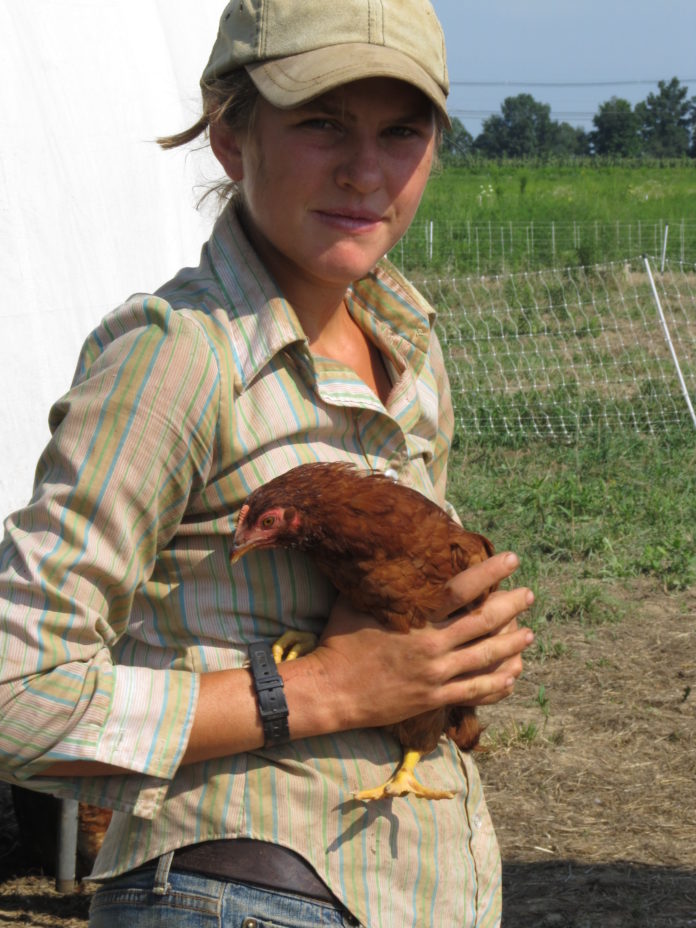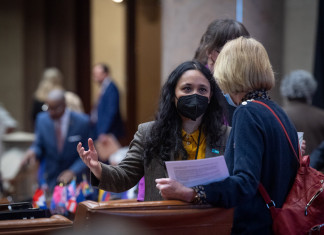
In the baking heat of midday, I meet Ashley Loehr in the middle of her well-tended vegetable field—a flat and organized plot of few weeds, well-drained soil, and vigorous plants. While her Sparrowbush Farm looks like other small vegetable farms sprouting in our agricultural landscape, Loehr hopes to distinguish it through a new model of growing—feeding families through the winter.
From November through May, when local food in the fertile Hudson Valley gets a bit more difficult to find, Ashley will be offering a Community Supported Agriculture share.
She arrived in the Hudson Valley in 2005, collaborating with various young farmers to begin the Germantown Community Farm (now Fog and Thistle Farm) where she co-ran a vegetable CSA for five years. During her time in this community, Ashley extensively surveyed CSA members—asking each what was missing from their diet and what would they like to be able to purchase from a local producer. The responses she received led Ashley to plan her niche market—growing winter crops. Running a CSA allowed her to discover and address the needs of her community, she says, adding that a CSA “is a partnership, a relationship that provides reliability, trust, and constant feedback.”
This marks Ashley’s first season growing at Sparrowbush Farm. The farm, at 2409 Route 9, comprises 98 leased acres just north of Clermont—land she found through the help of the Columbia Land Conservancy’s land-link farmer-match program—and it has 51 tillable acres suitable for pasture, hay, and vegetables, along with 16 acres of ponds and woodland.
The land was acquired by the Tinklepaugh Family, who still own the land, during the anti-rent wars of Columbia and Rensselaer counties between 1827-35. (Tenants rejected the feudal system of exploitation, and gained ownership and control of the land on which they lived.) The family then began the Tinklepack Apple Packing Company in the 1950s. More recently, this land has grown crops of hay, corn, and soy.
Ashley’s work continues this rich cultural and agricultural history.
In deciding to grow winter crops, Ashley says, “I wanted to focus and develop my skills on a smaller number of crops.” She is devoting her summer hours to growing vegetables and caring for livestock, without spending time marketing, harvesting, or running a CSA.
Ashley’s vision of feeding folks through the winter is also growing: along with vegetables, the offerings will include meat, dry beans, dairy, bread, sweeteners, and eggs. Ashley is collaborating with other growers and producers to provide a full, sustainably produced, diet for 40 families throughout the winter. The model of partnering with other farmers allows her to “provide a full diet while still being able to specialize—to achieve the goal of getting finesse into systems,” she says.
Of the shares she’s selling — a lump sum of $1,200 for the winter season — Ashley admits “it’s a big bite… a lot to stomach.” But for that, she adds, there’ll be grass-fed lamb, pastured pork, eggs, storage vegetables, dried herbs and flowers, and greenhouse greens from Sparrowbush; bread from Camphill Bakery in Copake; local milk and dry beans grown by Jordan Schmidt of Hearty Roots Farm in Tivoli; cheese from Amazing Real Live Food Company in Pine Plains, and one sweet treat each month—honey from Anarchy Apiaries in Germantown, maple syrup from Germantown, or homemade jam. Shares will be distributed every other week on Warren Street in Hudson.
After a few hours baking in the sun where Ashley and co-farmer Sarah Monteiro thin rutabegas to the two-inch spacing that the plants need to grow, we journey through the farm, visiting the grazing species who have all found shade to hide in. The pigs lounge in the woods, refusing to leave their shady paradise—they are moved each week to turn more ground and forage for the turnip treats seeded into their pasture; the 300 laying hens follow close behind them to clean up the grass they leave behind.
Along with ample fresh pasture, the lambs, pigs, and hens dwelling at Sparrowbush Farm get supplemental grain; the feed comes from producers who are transitioning to organic production—free from GMOs and conventional pesticides or herbicides.
When I ask what difficulties she anticipates in winter production, Ashley smiles and says casually that the hurdles are “yet to be discovered.”
To learn more about this full winter diet, visit Sparrowbush at www.sparrowbushfarm.com.







Facebook Comments